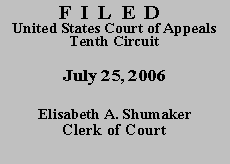

| ROBERT J. PROKOP, M.D.,
Plaintiff-Appellant, v. TIM HOCKHALTER; GERI HOCKHALTER; TOM McJUNKIN; TIMBERCREEK OUTFITTERS, Defendants-Appellees. |
|
The district court's order raised two questions of Wyoming law which appeared to be determinative of Dr. Prokop's case: whether the two-year statute of limitations applies to actions against outfitters and professional hunting guides and, if the two-year period does apply, does it apply to both contract and tort claims. See Prokop v. Hockhalter, No. 05-170, 2006 WL 1756031, at *1 (Wyo. June 28, 2006). There was no controlling Wyoming precedent on these issues, so this court asked the Wyoming Supreme Court to answer the two questions pursuant to Wyo. R. App. P. 11.
That court agreed to answer the questions and has now issued its decision, holding that "the two-year statute of limitations set forth in Wyo. Stat. Ann. § 1-3-107(a) applies to actions against licensed outfitters and professional guides" and that if the "cause of action . . . arises from an act, error or omission in the rendering of licensed or certified professional services, the two-year statute of limitations . . . applies regardless of whether the claim is pled in tort or contract." Prokop, 2006 WL 1756031, at *5-*6. This ruling is dispositive of the case.
Dr. Prokop's hunting outing ended on September 26, 2001, when he decided that a combination of factors made the hunt too difficult for him to continue. At that time, he knew that he had not harvested a big horn sheep and that he was dissatisfied with the professional guide's services. He was also aware that the professional guide had led him over difficult terrain, allegedly resulting in re-injury to his knee and severe pain on his way back to base camp. "Wyoming is a discovery state in which the statute of limitations is triggered when the plaintiff knows or has reason to know of the existence of a cause of action . . . . Under the discovery rule as adopted in Wyoming, the statute of limitations will typically run from the date of the incident." Reed v. Cloninger, 131 P.3d 359, 365-66 (Wyo. 2006) (quotation and citations omitted). The limitations period begins to run when a "plaintiff knows or has reason to know that []he has suffered damage due to another's wrongful act," even though "the consequences . . . are not fully known until later." James v. Montoya, 963 P.2d 993, 995 (Wyo. 1998).
Under Wyoming law, Dr. Prokop was required to commence his lawsuit within two years of September 26, 2001, the date he ended the hunt. On that date, he knew or had reason to know of the existence of his causes of action. He did not file his complaint, however, until October 1, 2003. We therefore AFFIRM the district court's entry of summary judgment in favor of defendants. Dr. Prokop's "Request for Reconsideration of Oral Argument" is denied. The panel's order to show cause, arising from Dr. Prokop's delayed filing of his Wyoming Supreme Court brief, is discharged.
Entered for the Court
Circuit Judge
*. After examining the briefs and appellate record, this panel has determined unanimously that oral argument would not materially assist the determination of this appeal. See Fed. R. App. P. 34(a)(2); 10th Cir. R. 34.1(G). The case is therefore ordered submitted without oral argument. This order and judgment is not binding precedent, except under the doctrines of law of the case, res judicata, and collateral estoppel. The court generally disfavors the citation of orders and judgments; nevertheless, an order and judgment may be cited under the terms and conditions of 10th Cir. R. 36.3.